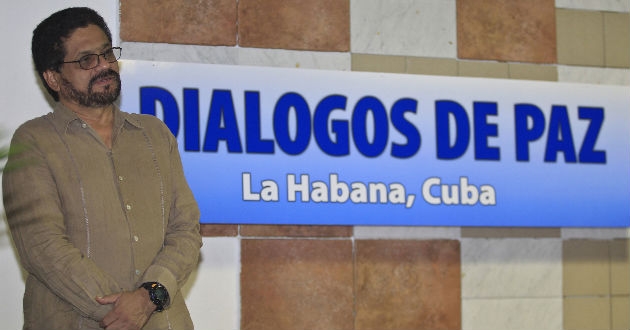At peace talks in Cuba, Colombian guerrilla group the FARC outlined a proposal to legalize drug consumption and cultivation, complementing reforms that are about to be tabled by the Colombian government.
Speaking at a press conference in Havana, the Revolutionary Armed Forces of Colombia (FARC) chief negotiator Luciano Marin, alias “Ivan Marquez,” made the announcement as part of the rebels’ proposals over land use — one of the six points on the agenda for the peace negotiations.
Marquez called for an “an end to policies of criminalization and persecution, [and] the suspension of aerial fumigation and other forms of eradication that are generating negative socio-environmental and economic impacts.”
He added the group wanted the government to “consider plans to legalize marijuana, poppy and coca crops that will be used for therapeutic or medicinal purposes, for industrial use or for cultural reasons.”
Marquez also called for the legalization of drug consumption, to be accompanied by “robust education” programs.
According to Colombian investigative news site La Silla Vacia, the FARC’s proposal for drug law reform “fits perfectly” with the latest draft of the government’s National Drug Statute, which the site obtained even though it will not be presented to Congress until March.
La Silla Vacia highlighted five areas in which the proposed law would converge with the FARC’s proposals: demonstrating the government is willing to reconsider the repressive approach to drugs; creating the possibility of legalizing drug crops; restricting aerial fumigation; and creating mechanisms in which coca growers and low-level guerrillas or collaborators will not end up in prison on drug trafficking charges.
Government officials denied there had been any consultation with representatives at the negotiating table, a claim which La Silla Vacia said it had verified.
InSight Crime Analysis
It is not surprising that there is considerable overlap between the FARC and the government proposals.
In recent years, President Juan Manuel Santos has emerged as a key figure in the campaign for international debate over drug laws, and has at least hinted at the sort of liberalization suggested by the FARC. His government has also overseen legislation decriminalizing the possession of small quantities of cannabis and cocaine.
This convergence can only benefit peace negotiations, as addressing the drug trade will, at some point, play a key part in determining the talks’ success. The FARC remains deeply involved in the drug trade, especially at the level of coca cultivation, and a central doubt hanging over the process is whether factions within the guerrillas would be willing to relinquish control of lucrative criminal networks to demobilize.

